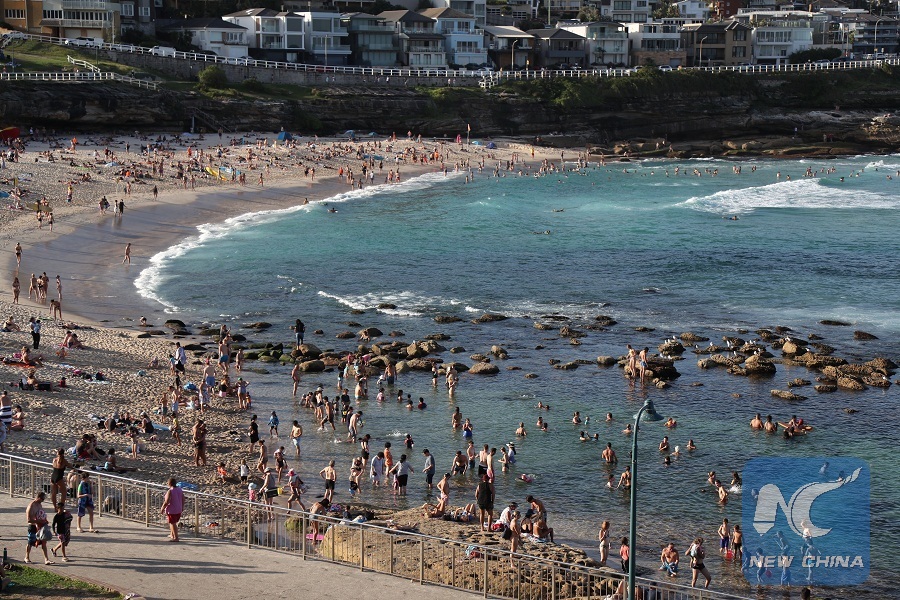
The photo shows people cool themselves at Bronte Beach in Sydney, Australia, on March 18, 2018. (Xinhua/Bai Xuefei)
SYDNEY, Jan. 10 (Xinhua) -- Last year was Australia's third warmest since records began, according to the national Bureau of Meteorology's (BOM) Annual Climate Statement for 2018.
While the news might be welcomed by Australia's ice cream vendors and air-conditioning salesmen, climate scientists down under are becoming increasingly alarmed.
"We have seen (carbon) emissions rise in Australia for the last four years, and with that we will see a continued rise in temperatures and a worsening of extreme whether," head of research and acting CEO at the Australian Climate Council Martin Rice told Xinhua on Thursday.
"What the data indicates is that climate change is intensifying in Australia and around the world, and we seeing new extreme heat records."
EVERY STATE AND TERRITORY IN AUSTRALIA HEATING UP
Compared to records from 1961 to 1990, Thursday's report shows that average temperatures were up 1.14 centigrades in 2018, with every single state and territory enduring higher than normal day and night-time temperatures.
"The average maximum temperature for the country as a whole was particularly warm, sitting 1.55 centigrade above the 1961-1990 average, making 2018 Australia's second warmest year on record for daily high temperatures," said senior climatologist at the BOM Dr. Lynette Bettio.
"Average minimum temperatures for 2018 were also 0.73 degrees celsius above average, the eleventh warmest on record."
NATIONAL RAINFALL TOTALS DRY UP
As well as being hotter, it was also dryer with September rainfall figures going down as the driest ever for the month.
Throughout the rest of the year, national rainfall measurements were 11 percent below the 1961-1990 average.
Bettio explained that across large areas of the country's southeast, rainfall totals were in the lowest 10 percent on record, exacerbating severe drought conditions that continue to ravage many rural and farming communities in Australia.
"New South Wales State had its sixth driest year on record, while the Murray-Darling River Basin saw its seventh driest year on record."
WARMER WHETHER SET TO CONTINUE
While last year will go down as a scorcher, the dramatic increase in temperatures is predicted to continue.
"With more greenhouse pollution levels in the atmosphere, we will continue to see temperatures rise," Rice said.
"Nine of Australia's hottest years on record have occurred since 2005 and this is part of a long-term trend that is being driven by climate change."
With this in mind, Rice and his team at the Australian Climate Council are urging more to be done in order to arrest the increasing temperatures.
"Australia is one of the sunniest and windiest countries on the planet," he said.
"So we must accelerate the transition away from fossil fuels and toward clean, reliable and affordable renewable energy technologies."
"We also need to look at ways we can make our agriculture and transport sectors more efficient."

